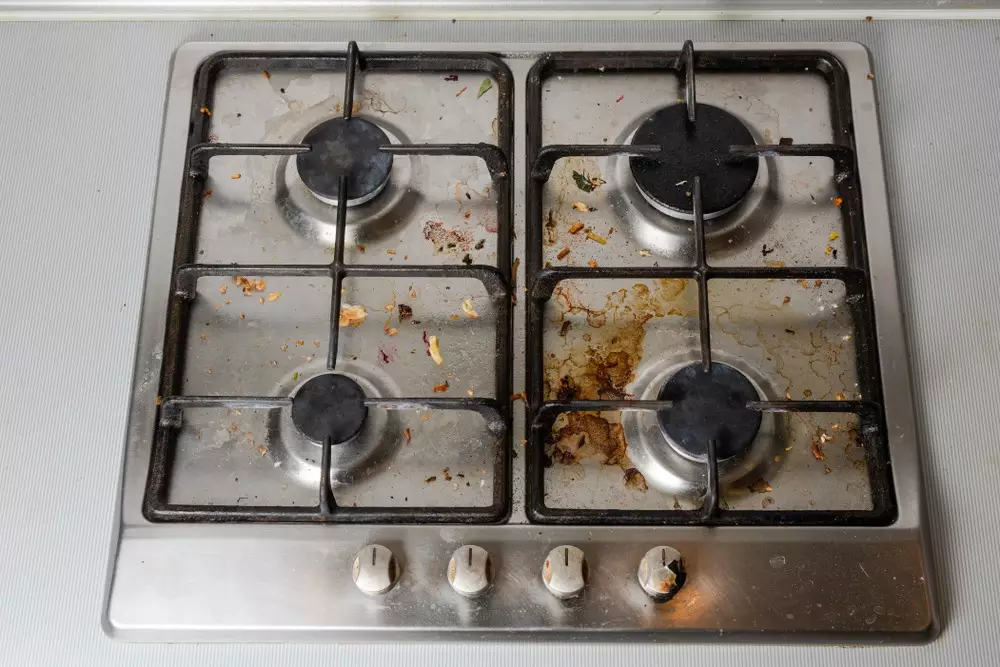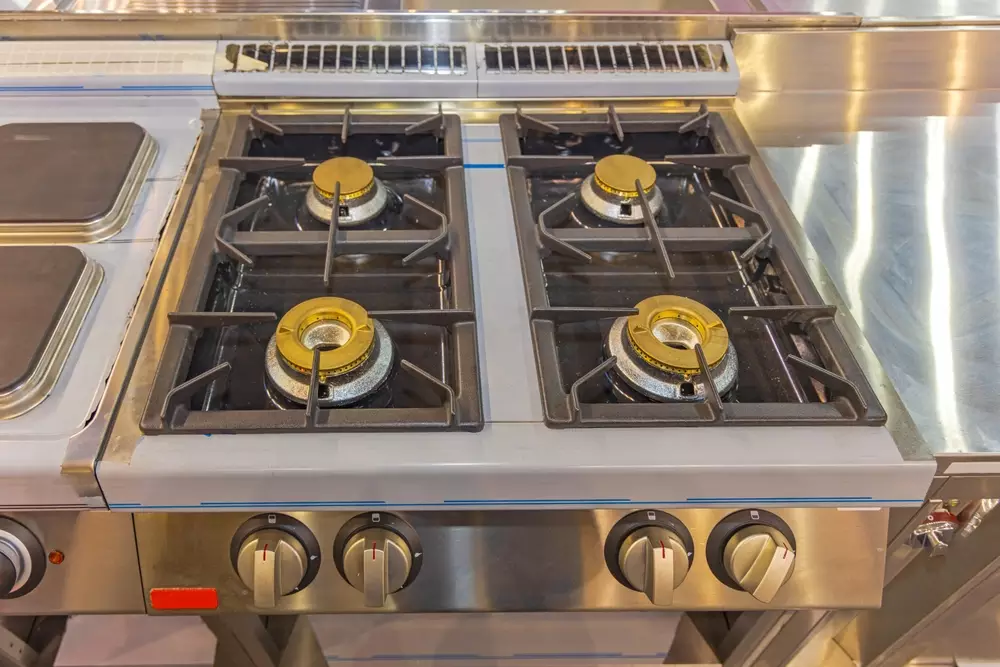Your kitchen is the heart of your home, and the gas stove is its beating soul. It’s where the culinary thing happens, delicious meals are born, and memories are made. But if you’ve ever looked at the burners, you know how quickly the cast iron grates can go from sparkling gems to filthy offenders in need of cleanup.
Clean gas stove top cast iron grates might not be the most desirable task, but it’s an essential one. Beyond the benefits of a dazzling stove, regular cleaning ensures safety, improves cooking performance, and prolongs the life of this crucial appliance.
In this article, we’ll unravel the mystery of cleaning those stubborn grates. We’ll walk you through the steps to achieve a sparkling, safe, and efficient gas stove.
Why Clean Your Gas Stove Top Cast Iron Grates?
Cleaning your gas stove top cast iron grates is a crucial step in maintaining a safe, efficient, and cost-effective kitchen. Here are some reasons why you should make cleaning these grates a priority:
- The foremost reason to keep your cast iron grates clean is safety. Over time, grease and food residue can accumulate on the grates, creating a hazardous environment. When you cook, this buildup can lead to unexpected flare-ups and even dangerous fires. A clean stove, on the other hand, reduces the risk of such incidents, ensuring that your kitchen remains a safe haven for culinary creativity.
- Clean grates are the secret ingredient to better cooking. When grates are free from grease and residue, they can distribute heat more evenly across your pots and pans. This even heat distribution translates to improved cooking results. Say goodbye to unevenly cooked meals and hello to perfectly seared steaks, evenly golden pancakes, and flawlessly simmered sauces.
- Regular maintenance, including cleaning, can significantly extend the life of your grates. When you neglect cleaning, grease and food particles can corrode the grates over time, leading to rust and deterioration. By keeping them clean, you’re not only preserving their functionality but also saving yourself from the expense of premature replacements.

Step-by-Step Cleaning Methods
How to clean gas stove top cast iron grates? Let’s dive into the step-by-step instructions for each of the cleaning methods:
Method 1: Clean with Dishwasher
- Put on your rubber gloves and safety goggles to protect your hands and eyes.
- Lift the cast iron grates off your stove and place them in a sink or a large bucket.
- Fill the sink or bucket with hot water until the grates are fully submerged.
- Pour a generous amount of mild dishwashing soap into the water. This will help break down grease and grime.
- Allow the grates to soak for at least 30 minutes, or longer if they are heavily soiled. This step will help loosen the stubborn residue.
- After soaking, use a nylon or brass brush to gently scrub away any remaining debris. A plastic scraper can be handy for stubborn spots.
- Rinse the grates under running hot water to remove all soap residue. Ensure they are completely clean before drying.
Method 2: Baking Soda and Vinegar Magic
- Put on your rubber gloves and safety goggles for protection.
- Take the cast iron grates off your stove and place them in a sink or on a protected surface.
- In a small bowl, mix baking soda with enough water to form a thick paste. This paste acts as a natural abrasive cleaner.
- Using a sponge or your hands, apply the baking soda paste generously to the grates, ensuring you cover all areas with stubborn stains.
- Allow the paste to sit on the grates for 15-20 minutes. This dwell time helps break down the grime.
- Use a nylon or brass brush to scrub the grates, focusing on areas with the baking soda paste. Stubborn stains should start to loosen.
- Rinse the grates thoroughly under hot water to remove the baking soda residue. If necessary, repeat the process for persistent stains.
- Fill a spray bottle with white vinegar and spritz the grates lightly. This will help neutralize any remaining baking soda and add shine.
- Pat the grates dry with paper towels or a clean cloth. Make sure they are completely dry to prevent rust formation.
Method 3: Dishwashing Soap Solution
- As always, put on your rubber gloves for protection.
- Take the cast iron grates off your stove and place them on a protected surface.
- Fill a basin or sink with hot water and add a generous amount of mild dishwashing soap to create a soapy solution.
- Submerge the grates in the soapy water and let them soak for about 15-30 minutes.
- After soaking, use a nylon or brass brush to gently scrub away any remaining grime and grease. Pay extra attention to stubborn spots.
- Rinse the grates under running hot water to remove all soap residue. Ensure they are completely clean before drying.
Method 4: Commercial Oven Cleaner (Optional)
- Ensure you’re wearing rubber gloves and safety goggles in a well-ventilated area.
- Take the cast iron grates off your stove and place them on a protected surface.
- Follow the instructions on the commercial oven cleaner’s label carefully, as different products may have specific guidelines.
- Spray the oven cleaner generously on the grates, covering all areas with built-up grime and stains.
- Most commercial cleaners require some dwell time. Follow the instructions on the label for the recommended waiting period.
- Use a nylon or brass brush to gently scrub the grates, focusing on areas with stubborn residue. Be cautious not to scratch the cast iron.
- Rinse the grates under running hot water, ensuring all cleaner residues are removed.

Maintenance Tips for Cast Iron Grates
Clean gas stove top cast iron grates is just the beginning of proper maintenance. To keep them in excellent condition and ensure they continue to enhance your cooking experience, consider these essential maintenance tips:
- Wipe Spills Promptly: After each cooking session, make it a habit to wipe down your grates with a paper towel or a damp cloth. Removing spills and food residue while they are fresh prevents them from becoming stubborn stains later.
- Burner Covers: Invest in burner covers or stove protectors. These inexpensive accessories help prevent spills and food debris from reaching the grates, making cleaning a less frequent chore.
- Avoid Harsh Cleaning Agents: Stick to gentle cleaning solutions like dishwashing soap, baking soda, and vinegar. Harsh chemicals can damage the seasoning on your grates and lead to deterioration.
- Regular Cleaning Schedule: Establish a routine for cleaning your grates. Depending on your cooking habits, this might be weekly or monthly. Consistency makes the cleaning process easier and more effective.
- Inspect for Rust: Periodically inspect your grates for any signs of rust. If you spot rust, address it promptly by scrubbing it off with a wire brush and applying a rust inhibitor to prevent further corrosion.
- Replace Damaged Grates: If your grates become warped or cracked beyond repair, it’s best to replace them. Damaged grates can lead to uneven cooking and safety hazards.
Dos and Don’ts
Cleaning cast iron grates requires a delicate touch to preserve their seasoning and longevity. Here are some important dos and don’ts to keep in mind:
Dos:
- Wear Protective Gear: Wear rubber gloves and safety goggles to protect your hands and eyes when handling cleaning agents.
- Remove Grates: Always remove the cast iron grates from the stove before cleaning. This ensures you can access all surfaces for a thorough cleaning.
- Use Gentle Cleaning Tools: Use nylon or brass brushes, soft sponges, and plastic scrapers to clean your grates. These materials effectively remove grime without scratching the cast iron.
- Soak When Necessary: Soaking grates in hot, soapy water can help loosen stubborn stains. It’s a useful step in the cleaning process but avoid prolonged soaking.
- Dry Thoroughly: After cleaning, pat the grates completely dry with paper towels or a clean cloth to prevent rust.
- Season After Cleaning: Apply a thin layer of vegetable oil or cast iron conditioner to the grates after cleaning. This re-seasons the cast iron, enhancing its non-stick properties and preventing rust.
- Store Properly: If you need to store the grates, make sure they are clean, dry, and stored in a cool, dry place. Apply a light coat of oil for added protection.
Don’ts:
- Don’t Use Harsh Chemicals: Avoid using strong chemicals, oven cleaners, or abrasive scouring pads on cast iron grates. These can damage the seasoning and compromise the integrity of the metal.
- Don’t Leave Food Residue: Don’t neglect to wipe down your grates after cooking. Leaving food residue can lead to stubborn stains that are harder to remove.
- Don’t Submerge for Extended Periods: While a soak is beneficial for loosening grime, avoid leaving your grates submerged in water for extended periods. This can promote rust formation.
- Don’t Use Steel Wool: Never use steel wool or abrasive materials to scrub cast iron grates, as they can scratch and damage the surface.
- Don’t Skip Drying: Skipping the drying step after cleaning can lead to rust. Make sure your grates are completely dry before storing them.
- Don’t Neglect Burner Openings: Don’t forget to clean the burner openings on your stove. Debris in these areas can affect gas flow and cooking performance.
- Don’t Overheat Grates: Avoid subjecting your cast iron grates to extreme temperature changes, such as placing hot grates in cold water. This can cause them to warp or crack.
Frequently Asked Questions
Is it safe to clean cast iron grates with oven cleaner?
Oven cleaning can be useful in getting rid of tough filth from cast iron grates, but it should only be used carefully. Make sure the oven cleaner you select is safe to use on surfaces made of cast iron.
How can I remove rust from my cast iron grates?
If you spot rust on your cast iron grates, don’t worry; it can be addressed. Here’s a simple method:
- Use a wire brush or steel wool to scrub the rusted areas until the rust is gone.
- Thoroughly rinse and dry the grates.
- To stop even more rust formation, use a rust inhibitor.
- Apply a little layer of cast iron conditioner or vegetable oil to the grates to reseason them.
Can I put my cast iron grates in the dishwasher?
It’s generally not recommended to put cast iron grates in the dishwasher. The high heat and moisture in dishwashers can strip away the seasoning and promote rust.
How often should I clean my cast iron grates?
Your cooking habits will determine how often you clean. However, it’s a good idea to clean your grates after each cooking session to avoid the accumulation of grease and residue.
Can I use my gas stove with rusty cast iron grates?
Although using rusted grates is not recommended, it is possible if the rust is quite minor. However, in order to stop the rust problem from getting worse, it must be resolved as soon as possible.
Conclusion
Your gas burner serves as a basis for gourmet innovation in the center of your kitchen. A clean gas stove is important for the safety, effectiveness, and longevity of your beloved item, it’s not just about appearance. You can ensure a safer, more effective kitchen, better cooking results, and a longer lifespan for your stove by regularly cleaning your cast iron grates.
Leave a Reply